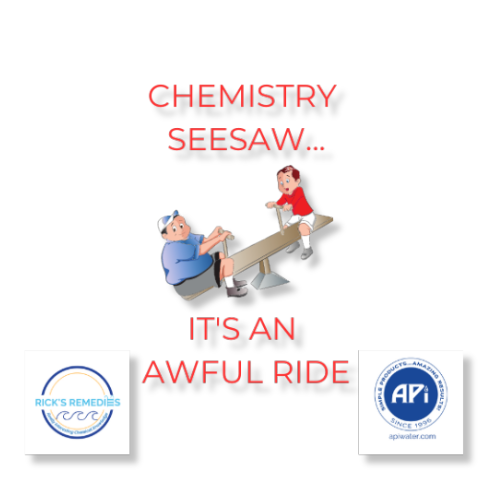Rick's Remedies: Chemistry Seesaw...It's an Awful Ride!

The "Start Up Season" is off and questions are coming to our Customer Experience Team FAST!
"What do I do if my chlorine is too high?"
"What if my pH is too low?"
"My alkalinity is off! What do I do to bring it up?" quickly followed by..."I overshot! What do I do to bring it down?"
We like to look at the positive side of things, so let's start there...
Congratulations! No one's pool is perfect ALL the time, and those who say it is have selective memory!
More often than not, pool owners are too embarrassed to discuss the chemical confusion and issues they experience when it comes to pool care.
Not a lot of people report chemical issues with consistent water. "Consistent Water?...What?" The times the water chemistry is high or low presents problems. We can break this down by every chemistry factor, but let's go simple and look at high and low chlorine levels and the issues they cause. High chlorine levels, especially those after having shocked or having overfed through a chlorinator can be problematic. The idea being, more of the good stuff to break down the not so good stuff in the water that we don't want, right? Wrong! Excessive chlorine use has downsides such as:
- break down of other pool chemicals
- oxidization of metals causing discoloration (we know how that worked out for Lady Liberty)
- creation of chloramines (contrary to popular belief, smelling chlorine (chloramines) after treating your pool is not a good thing)
- inability to safely enter the water (can you say, "OUCH!"
- damage to the pool cover
- damage to the pool surface
- damage to pool equipment
While the aforementioned issues are no fun, there are also downsides to having chlorine levels that are too low. Low chlorine readings can lead to:
- recreational water illnesses
- viruses (gross)
- parasites (gross)
- bacteria (grosser)
- algae (aka: swamp water)
- white water mold (looks a whole lot like your kids pink slime or wet tissue paper)
- contaminated biofilm, to name a few
- cloudy water and a host of other nasty water problems
With just as many problems on both sides of the chlorine reading, what is a pool owner to do? For starters;
- Don't rely on the fact that clear water means properly balanced water.
- Test your water frequently and adjust your levels as needed.
- Know the recommended ranges for the chemicals you are using.
- BE PATIENT! Chemical corrections and adjustments take time. Allow the product the recommended amount of time to work before adding more or other products.
- Less is More...generally speaking, it is better to add less chemical than you need to fix the issue at hand.
Pool chemistry consistency is kinda like the "magic butter zone"...It carries the maximum benefit with the fewest problems.
Your pool will get easier to manage allowing you more time enjoying it versus more time maintaining it.
Questions about water chemistry?
Need a recommendation?
Call or Text Us!
(877) 274-7261